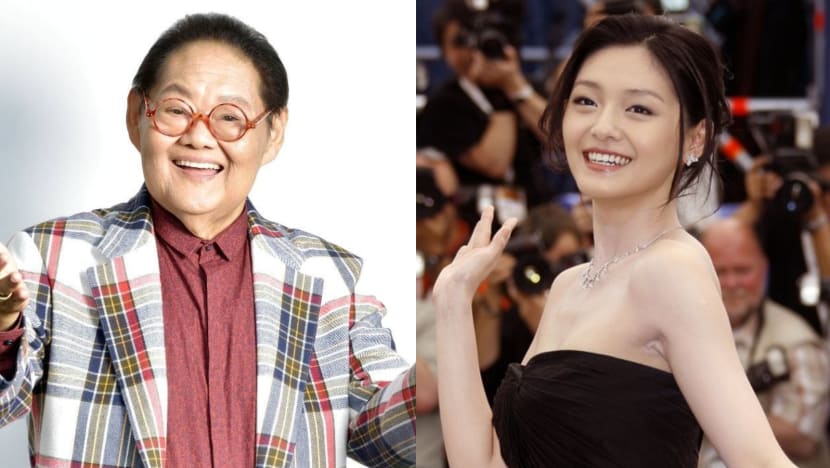Commentary: Why we mourn the death of stars like Moses Lim and Barbie Hsu
We may not know celebrities personally, but we’ve spent years watching them, listening to them and shaping our identities around them, says writer Annabel Lim.

Composite image of Moses Lim and Barbie Hsu. Lim died on Feb 11, 2025 at the age of 75, and Hsu died on Feb 2, 2025 at the age of 48. (Photo: Facebook/Moses Lim; Reuters/Eric Gaillard)

This audio is generated by an AI tool.
SINGAPORE: This year, we mourned the passing of Moses Lim, Barbie Hsu and Khalil Fong within the span of one month. Just as I was reminiscing about a beloved celebrity, another was gone.
To some, these deaths were just a series of headlines. But for us millennials, their passing feels like losing old friends we haven’t spoken to in a while – friends we assumed would always be around.
Singaporean sitcom Under One Roof, which Moses Lim starred in, was something everyone from Toa Payoh to Jurong could relate to. Lim’s character, Tan Ah Teck, was the quintessential Singaporean elder with his hilarious nuggets of “uncle logic”.
The show was a big part of my childhood during the 90s and 2000s, when binge-watching was non-existent. The hallmark of a great TV show wasn’t measured by streaming numbers but by how many kids rushed home to watch it on television.
Every commercial break was a mad dash to the toilet. Missing a scene triggered real FOMO (fear of missing out) when everyone else would discuss it at recess the next day. There was no such thing as pause and replay.As a teenager in the early 2000s, Meteor Garden was a cultural glue that brought everyone together. But beyond the drama, Barbie Hsu was a quick-witted variety show host and a pioneering beauty influencer. Even now, I find myself sharing advice from her Beauty King book on reducing water retention to friends. Her sudden passing felt jarring, like a piece of my youth had been ripped away without warning.
Likewise, Khalil Fong’s music was the soundtrack to my long bus rides home. His songs were timeless, unaffected by the fleeting trends of Mandopop. He was only 41. That fact alone made me pause. I’m not that far from 41. His passing was a stark reminder that talent, no matter how enduring, is not immune to time.
PARASOCIAL RELATIONSHIPS WITH CELEBRITIES
Why do we feel emotional when a celebrity dies? They were neither family nor friends. We don’t know them personally, yet we’ve spent years watching them, listening to them, and in some ways, shaping our identities around them. They were constants in our lives, accompanying us through different phases of growing up.
Psychological research shows that one’s reaction to the loss of a parasocial relationship correlates with the intensity of the bond and the individual’s attachment style. These relationships can be a positive thing, fulfilling emotional needs and offering a sense of connection.
Celebrity deaths don’t just mark the end of their lives; they symbolise the passing of time in our own. If they’re gone, it means we’ve also aged. Their deaths serve as a reality check, forcing us to confront our own mortality and reflect on what we have or haven’t achieved.HONOURING THE MEMORY OF CELEBRITIES
When I was 16, Cantopop superstar Leslie Cheung took his life. Every newspaper had him on the cover, television and radio stations ran tributes.
I dragged a friend to his memorial at a hotel in Orchard, and was probably the youngest there, in my school uniform. I felt the need to pay my respects to this superstar who sang my favourite song and played the male lead in the many Hong Kong films I had grown up watching.
In my own way, I honoured him by writing about my experience for my Chinese “O” Level essay, the topic being the saddest day of the year. That composition earned me a distinction, and I like to think of it as his way of “blessing” his fans.
Today’s generation engages with entertainment differently. They might follow an actor for a season of a show, binge-watch their performances and move on to the next viral sensation.
That’s not to say Gen Z and beyond won’t feel the weight of celebrity deaths. Social media fosters parasocial relationships and creates the illusion of an even closer connection. One day, the TikTok stars they grew up watching, the YouTubers who shaped their humour, or the artists whose songs defined their teenage years will start disappearing. And when that happens, they’ll feel the same way we do now.A REMINDER TO SEIZE THE DAY
There’s a strange kind of grief that comes with losing celebrities of yesteryear. When we lose someone who was a fixture of our youth, we’re also mourning a version of ourselves.
Their passing reminds us of how much time has passed and how important it is to cherish the things that remain. Their legacies live on in reruns, old albums and the quiet echoes of nostalgia. Maybe that’s the only way we can keep holding on, even if they never knew us personally.
Perhaps now is also a good time to reflect on how often we procrastinate.
If you want to watch that concert, go. Because you never know when it will be the last time that singer performs live.
If you want to eat that bowl of noodles, go. Because you never know when the hawker decides to hang up his wok.
If you want to catch up with a friend, do it. Open WhatsApp and send that text.
Don’t wait because next time might never come. You may regret it when the inevitable happens.
Annabel Lim is a communications consultant with We Communications Singapore.

















